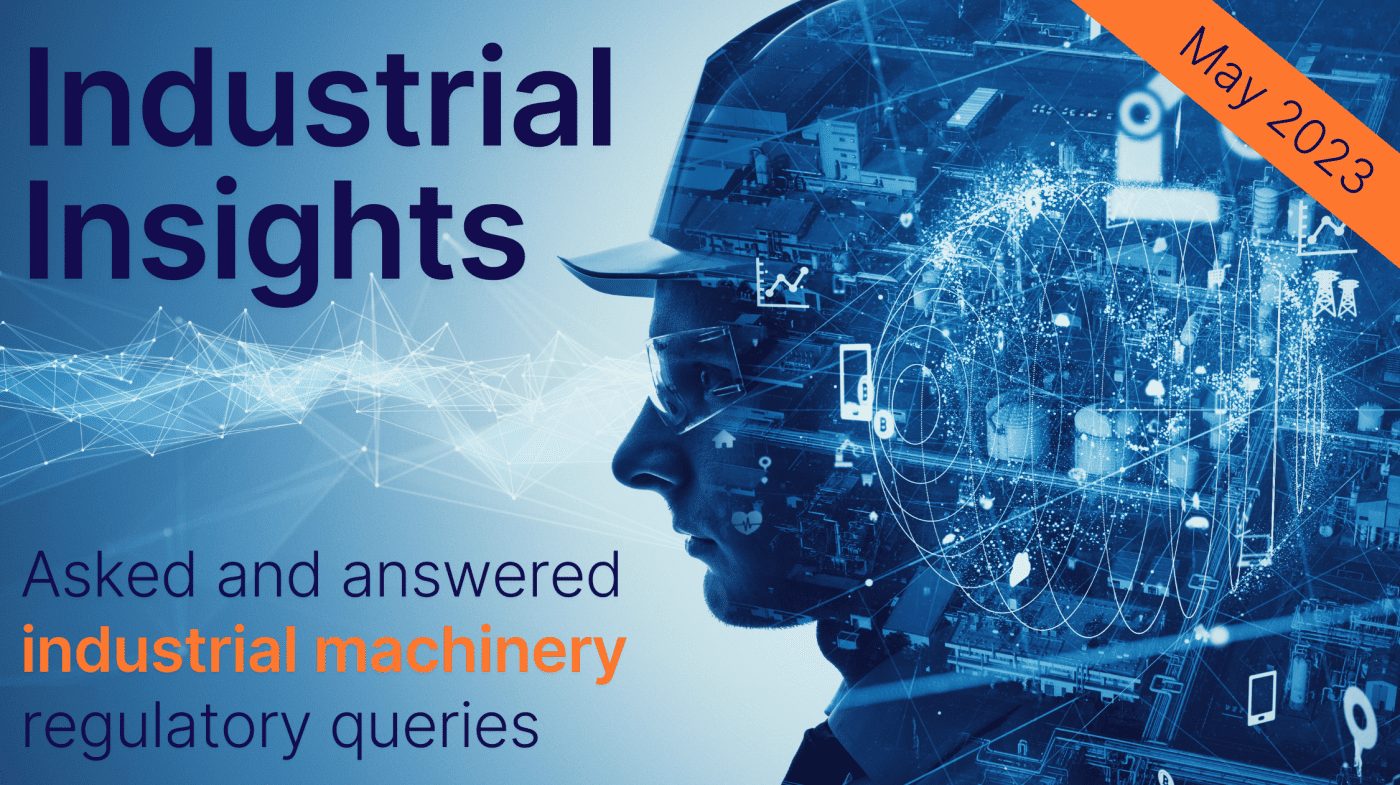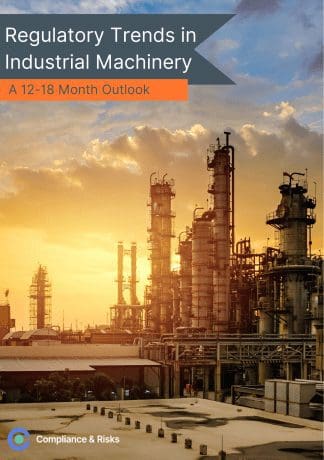
Industrial Insights: Top Industrial Machinery Queries – May 2023

How do you stay ahead of regulatory changes in industrial machinery? To help you maintain continuous market access, our monthly feature Industrial Insights gathers some of the most interesting Industrial Machinery regulatory queries from Compliance & Risks customers.
For an in-depth overview of the new EU law, the proposed Machinery Products Regulation, download our whitepaper “EU Machinery Legislation: Current and Proposed Product Regulation“.
May’s Top Queries
Question 1:
Under the French Anti-waste and Promotion of Circular Economy Law 2020-105, is the requirement to issue an Eco-Design plan applicable to Industrial Equipment as well?
The French AGEC law introduced a new Article L 541-10-12 to the Environmental Code requiring any producer of products subject to EPR to draw up and implement an eco-design plan.
It applies to products that are subject to EPR in France that are listed in Article L 541-10-1.
Article L 541-10-1 does not specifically list industrial equipment but it does include professional electrical and electronic equipment, and professional packaging. The question is really whether your product is subject to EPR requirements in France or not.
For further information please see the text of these Articles in the French Environmental Code:
- Article L 541-10-12 (requirement to draw up and implement the eco-design plan)
- Article L541-10-1 (List of covered products by EPR sector)
Question 2:
What are the certification requirements for power tools (sanders, polishers, dust extractors) for industrial use in Brazil? Is safety certification required?
Our tools are equipped with Bluetooth and therefore ANATEL certification is required. I read there had been some changes in the process and simplified analysis could be performed?
Is Portuguese required for the labels on the tools?
There are no indications that such power tools are subject to Inmetro certification in Brazil. The compliance requirements of machines and equipment for professional use destined for Brazil are set out in Norma Regulamentadora NR-12 issued by the Ministry of Labor and Employment, which contains occupational health and safety requirements and minimum safety requirements for machinery and equipment for all phases of use, including information on compliance related to manufacturing, import and marketing.
The obligations envisaged by the NR12 regulation can be classified into three main categories:
- Machine safety requirements (structural, functional, etc.);
- Safety requirements related to the use of the machine;
- Documentary requirements.
The machine safety requirements are targeted (directly or indirectly) to the manufacturer of the machine or equipment. Therefore, machine manufacturers exporting machines to Brazil are required to design the machine by carrying out a risk analysis in accordance with the technical standards and specific requirements of the NR 12 standard.
Note: NR 12 does not apply to electrically operated portable tools and transportable tools that meet the constructive principles established in a national technical standard type “C” or, in the absence thereof, in an applicable international technical standard. So, for example, tools produced to IEC 62841 do not need to additionally meet the dictates of NR 12.
With regard to your question on ANATEL certification, the most recent change that matches your description appears to be Ordinance No. 2257, establishing the Internal Procedure for the Simplified Analysis of Approval Requirements for Telecommunications Products. In short products in the Telecommunications Products Reference List, are subject to evaluation through simplified analysis described in Articles 4 – 9. Exceptions apply per Article 3. Please note that we are in the process of adding Ordinance No. 2257 to C2P.
ANATEL labels should comply with the model set out in Act No. 4088/2020. Label examples here use the Portuguese language only.
In terms of NR 12, machines and equipment must have an instruction manual provided by the manufacturer or importer, with information regarding safety at all stages of use. Such manuals must be written in Portuguese (Brazil), with type and size characters that allow the best possible legibility, accompanied by explanatory illustrations.
Question 3:
Regarding Maine (USA) prohibitions of PFAS, are there any exemptions given to Control Reference Material chemicals used for calibration of analytical equipment and PFOS analysis and analytical equipment itself used in the detection of PFAS?
In a statute enacted by the legislature in 2021 – Maine (USA): Prohibition of Products Containing Perfluoroalkyl and Polyfluoroalkyl (PFAS) Substances, House Paper 1113, Legislative Document 1503 Enacted, 2021, there is a clause reading:
B. “Currently unavoidable use” means a use of PFAS that the department has determined by rule under this section to be essential for health, safety or the functioning of society and for which alternatives are not reasonably available.
The bill in question, below, (the amending text is in bold) provides that the regulating agency (or the legislature) will identify particular products that will be subject to the PFAS prohibition, and the prohibition of PFAS in these related laws and regulations do not appear by rule to apply to “all products”, and it appears that the items you have identified may be exempted if a similar product has been subject to “adopted rules that identify a relevant related product category or use for sales prohibitions”:
[Proposed amendments]The department may by rule identify products by category or use that may not be sold, offered for sale or distributed for sale in this State if they contain intentionally added PFAS. Not later than January 1, 2025 and every year thereafter until December 31, 2029, the department shall adopt a rule identifying at least one product category or use that may not be sold, offered for sale or distributed in this State if it contains intentionally added PFAS. The department shall prioritize the prohibition of the sale of product categories that, in the department’s judgment, are most likely to cause contamination of the State’s land or water resources if they contain intentionally added PFAS. Products in which the use of PFAS is a currently unavoidable use as determined by the department may be exempted by the department by rule except that, prior to January 1, 2028, such a determination may not be made unless the department has adopted rules that identify a relevant related product category or use for sales prohibitions as authorized by this paragraph. The department may not prohibit the sale or resale of used products.
Here’s the legislative summary from Page 4 pertaining to the above:
“It prohibits the department prior to January 1, 2028 from providing an exemption for products in which the use of PFAS is a currently unavoidable use unless the department has adopted rules that identify a relevant related product category or use for a sales prohibition”
And here is the original text as enacted in 2021:
C. The department may by rule identify products by category or use that may not be sold, offered for sale or distributed for sale in this State if they contain intentionally added PFAS. The department shall prioritize the prohibition of the sale of product categories that, in the department’s judgment, are most likely to cause contamination of the State’s land or water resources if they contain intentionally added PFAS. Products in which the use of PFAS is a currently unavoidable use as determined by the department may be exempted by the department by rule.
(at Maine (USA): Prohibition of Products Containing Perfluoroalkyl and Polyfluoroalkyl (PFAS) Substances, House Paper 1113, Legislative Document 1503 Enacted, 2021)
Regulatory Trends in Industrial Machinery: a 12-18 Month Outlook
Safety of machinery is always of paramount importance to regulators, however with the rise in new technologies the concept of safety has been stretched and regulators find themselves having to be concerned with new concepts such as connectivity, artificial intelligence and data reliability & protection.
Continue reading our 12-18 month analysis of regulatory trends in industrial machinery, and deep-dive into our analysis of upcoming industrial machinery regulations for the coming 12-18 months.
Your Questions Answered
Many of the above questions were submitted and answers were conveyed to Compliance & Risks customers via the “Ask Our Experts” button in C2P.
Clients use AOE to ask about the latest proposed, enacted and amended regulations and mandatory standards applicable to their products and geographies of interest.
When AOE questions can be answered in 30 minutes or less, Compliance & Risks’ subject matter experts answer them at no charge!
To learn more about C2P and how Compliance & Risks’ SMEs can help you with your questions, contact us today.
Meet our Expert

Emilia Assenza, Senior Regulatory Compliance Specialist, Compliance & Risks
Emilia Assenza is a Senior Compliance Specialist with over 5 years experience in the legal compliance sector.
She keeps clients up to date on global regulatory developments, with a particular focus on consumer protection.
She graduated cum laude with a Master’s Degree in Law at University of Catania, Italy and holds a Postgraduate Diploma in Legal Professions.



